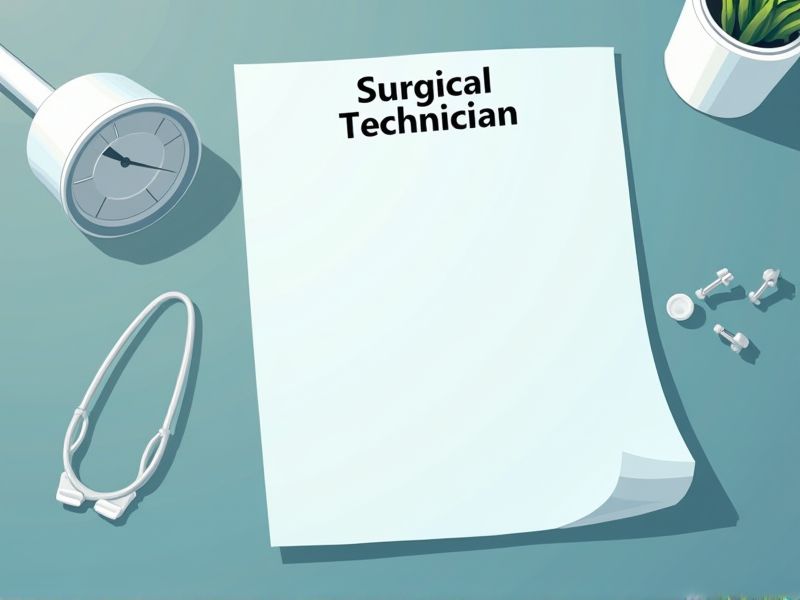
Surgical Technicians play a vital role in the operating room, requiring specific skills to assist surgical teams effectively. Certain certifications ensure they possess the necessary knowledge and competencies to maintain patient safety and operational efficiency. These credentials validate their proficiency in managing sterile environments and mastering essential surgical procedures. Here are some important certifications needed for a Surgical Technician.
Certified Surgical Technologist (CST)
The presence of a Certified Surgical Technologist (CST) in the operating room enhances patient safety, as they possess standardized knowledge and skills essential for surgical procedures. Their certification demonstrates a commitment to continuing education and compliance with best practices, reducing the potential for errors. Hospitals and surgical centers benefit from the CST's expertise in maintaining a sterile environment and managing surgical instruments, which can improve overall surgical outcomes. Employing CSTs often leads to increased efficiency during surgeries due to their proficiency and ability to anticipate the needs of the surgical team.
Certified Surgical Assistant (CSA)
The presence of a Certified Surgical Assistant (CSA) enhances the efficiency of surgical procedures by allowing the surgical technician to concentrate on crucial preparatory tasks. CSAs possess advanced knowledge and skills that support complex tasks such as tissue retraction and wound closure, which alleviates pressure on surgical technicians. The collaboration between a CSA and a surgical technician promotes a safer surgical environment as it reduces the likelihood of errors. Having CSAs as part of the operative team streamlines communication and coordination, leading to more cohesive and effective surgical outcomes.
National Certified Surgical Technologist (NCST)
The National Certified Surgical Technologist (NCST) certification ensures that surgical technicians meet standardized levels of competency and skill, enhancing patient safety during procedures. Having certified professionals in the operating room reduces the risk of errors and complications due to consistent adherence to best practices. Hospitals and surgical centers often favor hiring certified technicians as this demonstrates a verified commitment to quality care and continued education. Certification fosters professional growth and career advancement opportunities for surgical technicians by validating their expertise in the field.
Basic Life Support (BLS) Certification
Surgical technicians often encounter critical situations where immediate intervention can make a significant difference, necessitating BLS certification for enhanced preparedness. This certification ensures they possess the essential skills to maintain patient safety during preoperative and postoperative phases. Hospitals and employers prioritize BLS-certified professionals, which reflects a commitment to comprehensive patient care. The certification also aligns with regulatory standards that emphasize readiness for emergency medical situations within a surgical setting.
Advanced Cardiac Life Support (ACLS) Certification
Advanced Cardiac Life Support (ACLS) Certification provides surgical technicians with critical skills to identify and respond to cardiovascular emergencies, which can improve patient outcomes during surgery. Understanding advanced resuscitation techniques ensures surgical technicians can effectively support physicians in life-threatening situations. Enhanced proficiency in managing acute cardiac conditions reduces the risk of complications, promoting safer surgical environments. As surgical procedures become more complex, ACLS-certified technicians contribute to a highly competent surgical team prepared for emergency interventions.
Certified Registered Central Service Technician (CRCST)
Surgical procedures necessitate sterile environments; the CRCST ensures proper sterilization and handling of surgical instruments, preventing infections. A thorough understanding of instrument decontamination minimizes surgical delays, aiding in efficient surgical scheduling. CRCST professionals provide crucial support in inventory management, guaranteeing that surgical teams have access to necessary tools. Skilled CRCSTs enhance patient safety by upholding stringent sterilization standards, indispensable for surgical technicians' workflows.
Certified Sterile Processing and Distribution Technician (CSPDT)
A Certified Sterile Processing and Distribution Technician (CSPDT) ensures that surgical instruments are properly sterilized, reducing the risk of infection during procedures. This certification guarantees that the technician is knowledgeable about the latest sterilization protocols and equipment, leading to increased surgical efficiency. Without a CSPDT, surgical teams might face delays due to improperly handled instruments. Certified technicians contribute to maintaining hospital accreditation and meeting regulatory compliance, which is crucial for patient safety and institutional reputation.
OSHA Safety Certification
OSHA Safety Certification ensures that surgical technicians understand and implement safety protocols in the operating room, reducing the risk of workplace injuries. Proper training in safety standards contributes to a decrease in infection rates, crucial in the healthcare environment. Certification equips surgical techs to handle equipment and hazardous materials safely, minimizing potential health hazards. Consistent adherence to OSHA guidelines fosters a culture of safety, enhancing overall patient care and workplace efficiency.
Lean Six Sigma Yellow Belt Certification
Lean Six Sigma Yellow Belt Certification equips surgical technicians with problem-solving skills that can optimize surgical processes and enhance patient outcomes. This certification offers a structured methodology to identify inefficiencies, leading to reduced operation times and costs. Surgical technicians trained in Lean Six Sigma can better manage resources, resulting in improved workflow and less waste. Hospitals with certified staff often experience increased surgery success rates and higher patient satisfaction levels due to streamlined procedures.
Certification in Infection Control (CIC)
Certification in Infection Control (CIC) ensures a surgical technician is proficient in preventing healthcare-associated infections. This proficiency reduces the risk of postoperative complications for patients. With certification, technicians contribute to maintaining safe surgical environments. Employers are likely to prefer certified candidates, given their demonstrated expertise in infection control practices.
Summary
When you obtain certifications as a Surgical Technician, you enhance your qualifications, making you a more competitive candidate in the job market. This additional validation of skills often results in increased job opportunities and may lead to higher salary prospects. Employers are more likely to trust your capabilities, allowing you access to more specialized roles within surgical teams. Certifications also foster a deeper understanding of your field, potentially leading to improved patient outcomes and job satisfaction.
